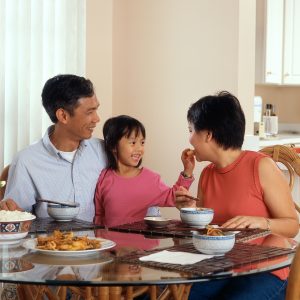What is Relatedness?
So far, we’ve talked about some important concepts around feeding kids that not only help them to be healthy eaters but also help them to grow up to be self-sufficient, well-adjusted people. To review, some concepts we’ve discussed are autonomy or helping your child make good decisions for themselves, and competence, which means helping a child feel confident to tackle new tasks and situations. Today, we’re going to talk about a third concept that is just as important to raising a healthy eater, which is relatedness. We’ll cover what it is, why it’s important, and how you can encourage relatedness at home.

What is relatedness?
Relatedness is a child’s feeling of belonging and connectedness with others. Relatedness helps kids feel lovable and allows them to view the world as positive and trustworthy. It affects their sense of safety and security in their environments and even impacts the way they respond to new people, experiences, and new foods. As you can imagine, this important positive feeling starts at home!
Why is relatedness important?
When it comes to healthy eating, relatedness is important because it helps kids form healthy & positive eating habits. For example, if a child learns relatedness through family meals, trying new food with parents and siblings, and cooking with you, they might become a more adventurous eater. They may be willing to try new foods more often or attempt to make themselves a healthy snack. As an added bonus, many of the things moms can do at home to help encourage relatedness can also support autonomy and competence- major mom-win!
How can we encourage relatedness?

Relatedness is encouraged through food when kids spend meaningful time with their families sharing food-related experiences. Here are just a few ways you can encourage relatedness with your child
- Enjoying food together: this can be a snack, a family meal, a cup of tea, a weekly Saturday breakfast – it doesn’t matter, as long as you’re together! Spending time talking, laughing, and sharing a meal or drink helps your child connect healthy food with positive feelings, which leads to better food choices!
- Cook together: Cooking together = spending time together over food, which is what relatedness is all about! Be sure to talk about what you’re making or explain to kids where you learned this dish and why you like it. Cooking together is a bonus because it helps encourage autonomy and competence, too!
- Talk about food: Interactions around food, be it nutrition education, encouraging your child to try a new food, or giving them positive praise for positive actions, are all encouraging relatedness. When you’re having positive interactions around food and family, you’re teaching your child a positive sense of relatedness.
Relatedness helps your child become a healthy eater for life and supports their success socially. As mentioned, a lot of the actions that encourage relatedness also encourage competence AND autonomy, so you can be sure you’re helping your child become more well-rounded in a number of ways. In what ways do you encourage relatedness in your home? Have you tried any of these tips?